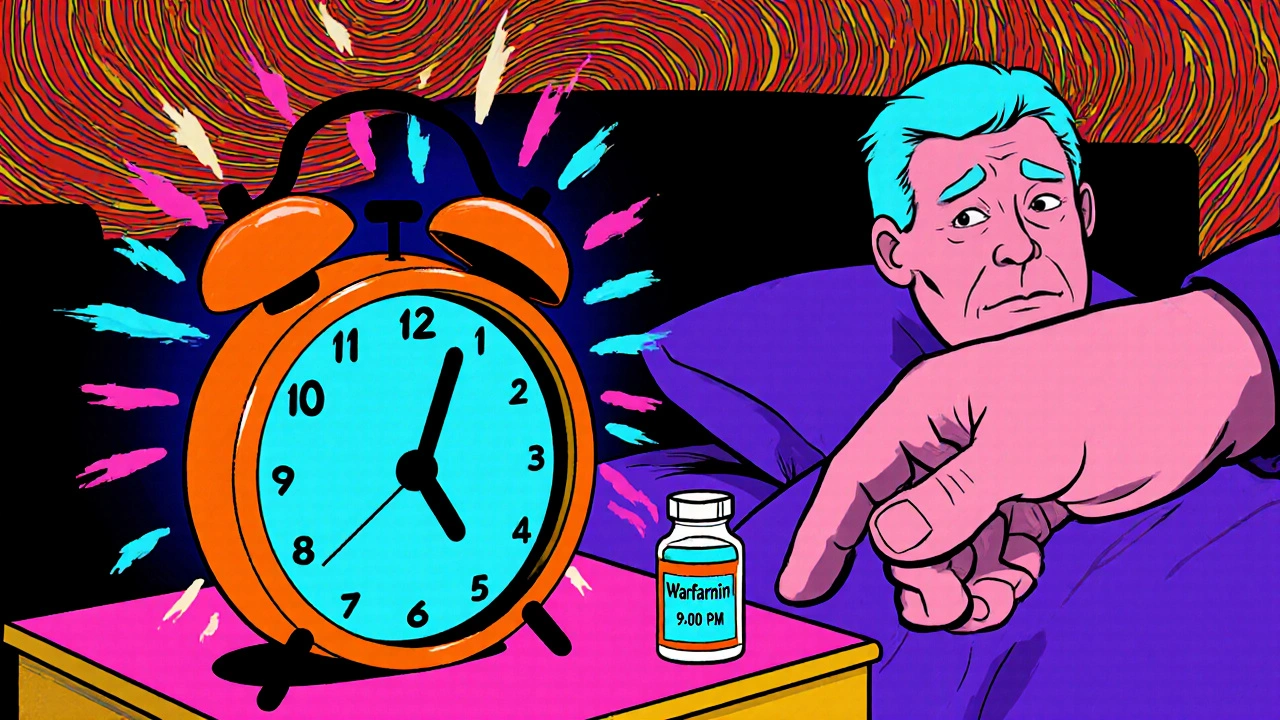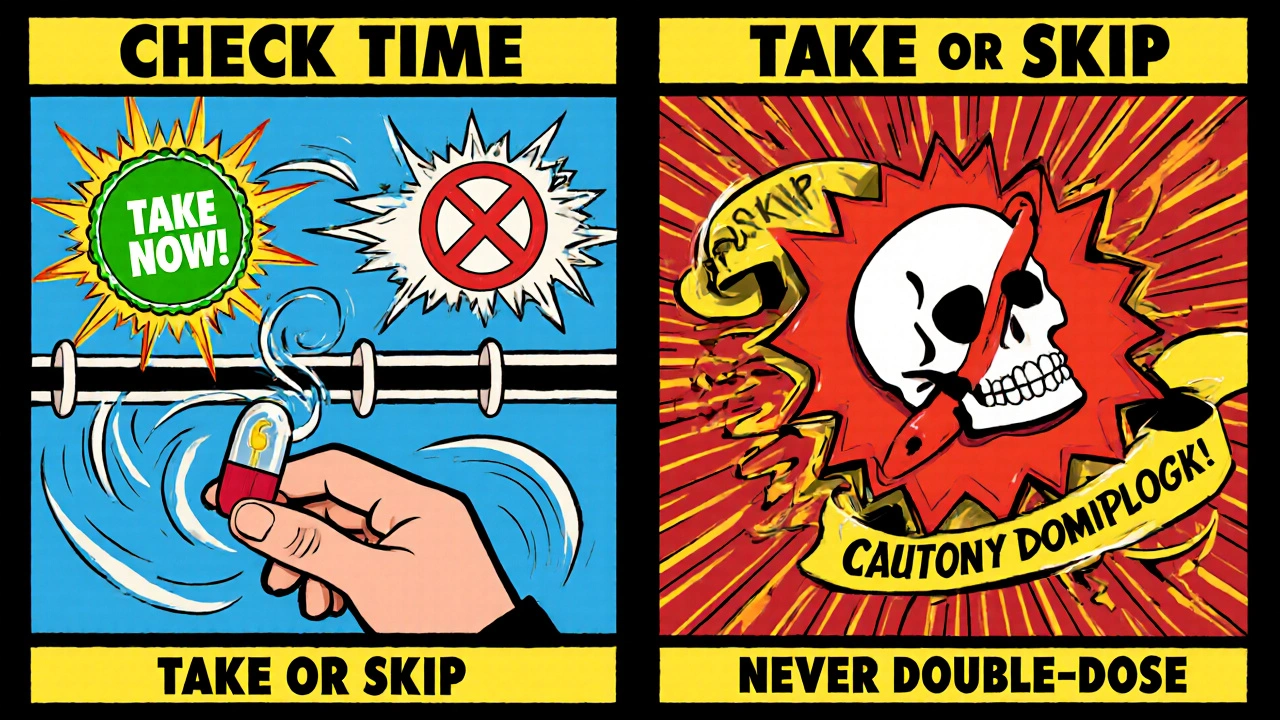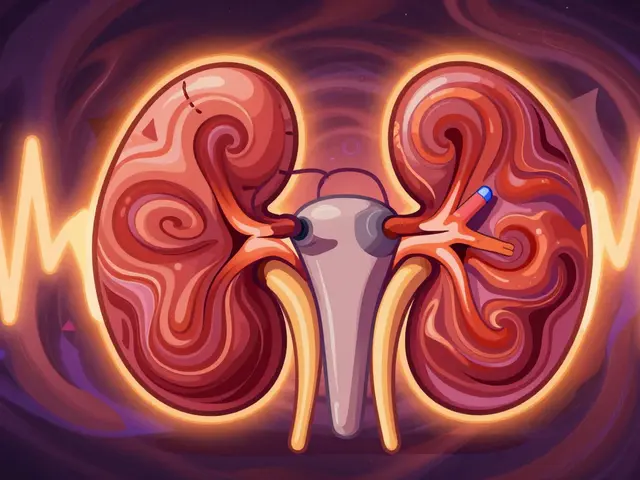
Missed Blood Thinner Dose Calculator
What to do when you miss a dose
Enter your medication type and how many hours ago you missed your dose. This tool will tell you the correct action based on medical guidelines.
Skipping a dose of a blood thinner feels harmless until the clock ticks and a clot starts forming. Whether you’re on warfarin, a newer direct oral anticoagulant (DOAC), or an antiplatelet, the stakes are high. This guide tells you exactly what to do the moment you realize a dose was missed, how to decide if you need urgent medical help, and practical tricks to keep your schedule on track.
Key Takeaways
- Take a missed warfarin dose within 12 hours; otherwise, skip it and continue with the next scheduled dose.
- For most DOACs (apixaban, rivaroxaban, dabigatran) take the missed pill as soon as you remember, unless it’s >6 hours from the next dose.
- Never double‑up. Doubling raises bleeding risk dramatically.
- Contact your anticoagulant clinic or call emergency services if you notice bruising, blood in urine or stool, severe headache, shortness of breath, or a fall with head injury.
- Use reminder tools, keep a written log, and refill prescriptions before they run out to prevent future misses.
Why Missing a Dose Matters
Blood thinners, medically known as anticoagulants medications that reduce the blood’s ability to clot, protecting against strokes, deep‑vein thrombosis, and pulmonary embolism, work by maintaining a delicate balance. Slip up on the schedule, and that balance tips toward clot formation or, if you over‑correct, dangerous bleeding.
Studies show a single missed dose can boost clot risk enough to trigger a DVT or stroke, especially in patients with atrial fibrillation where the annual stroke risk without anticoagulation ranges from 1.5 % to 6.6 % (American College of Cardiology, 2020). Even minor bleeding-gum bleeding, occasional nosebleeds-can become serious if a dose is doubled to “make up” for the miss.
What Happens When You Forget a Dose?
Different agents have different half‑lives, so the impact of a missed pill varies:
- Warfarin a vitamin‑K antagonist with a half‑life of 20-60 hours, requiring INR monitoring maintains therapeutic effect longer, but missing multiple consecutive doses can still push INR out of range.
- DOACs like Apixaban a factor Xa inhibitor taken twice daily (half‑life 8-15 hours) lose protective coverage faster, so a single miss can create a 6‑hour gap without anticoagulation.
- Similar timing applies to Rivaroxaban once‑daily factor Xa inhibitor and Dabigatran direct thrombin inhibitor, also taken twice daily.
When the protective effect wanes, clots can form in the heart, legs, or lungs. If a clot travels to the brain, a stroke can happen within hours.

Step‑by‑Step: What to Do After Missing a Dose
- Check the time you missed the dose. If it’s been less than the safe window (12 hours for warfarin, 6 hours for most DOACs), take it right away.
- If you’re beyond the window, skip the missed pill. Taking it now would overlap with the next scheduled dose, increasing bleed risk.
- Do NOT double‑dose. The rule applies to every anticoagulant; a double dose can push INR or drug levels into dangerous territory.
- Resume your normal schedule. Take the next dose at the usual time, even if it feels earlier than you’d like.
- Document the miss. Write the date and time in your anticoagulant clinic the healthcare team that monitors your blood thinner therapy log or in the yellow warfarin book.
- Contact your clinic if you’re unsure. If you missed more than one dose in a row or have any concerning symptom, call right away.
Medication‑Specific Missed‑Dose Guidance
| Medication | Typical Dose Time | Window to Take Missed Dose | Action After Window |
|---|---|---|---|
| Warfarin | Evening | Within 12 hours | Skip and continue with next scheduled dose; call clinic if >12 hours |
| Apixaban (Eliquis) | Twice daily (12 h apart) | Within 6 hours | Skip if >6 hours; do not double‑dose |
| Rivaroxaban (Xarelto) | Once daily | Within 8 hours | Skip if >8 hours; resume next day |
| Dabigatran (Pradaxa) | Twice daily | Within 6 hours | Skip if >6 hours; continue regular schedule |
Red‑Flag Symptoms: When to Seek Immediate Help
If any of these appear after a missed dose-or even without a miss-treat them as emergencies:
- Unexplained bruising or large hematomas (especially on the abdomen or limbs).
- Red, brown, or pink urine (possible internal bleeding).
- Black or tarry stools (digested blood).
- Sudden severe headache, confusion, or loss of vision (possible brain bleed).
- Shortness of breath, chest pain, or rapid heart rate (possible pulmonary embolism).
- Faintness, dizziness, or loss of balance after a fall, especially with head impact.
Call NHS 111, your local emergency number, or go to the nearest A&E immediately. Bring your medication bottle, any patient‑provided leaflets, and your anticoagulant record (the yellow book for warfarin).

How to Report a Missed Dose
Every missed dose belongs in your written log. For warfarin, the yellow book the official warfarin record used in the UK is the standard. For DOACs, a simple notebook or a phone note works, as long as you share it with your clinic at the next appointment.
When you call the clinic, have these details ready:
- Medication name and dose.
- Time you normally take it.
- Exact time you realized the miss.
- Any symptoms you’re experiencing.
The clinic may ask you to get a blood test (INR for warfarin) or simply adjust your next dose.
Prevention: Tools and Tricks to Stay on Track
Missed doses often happen because of routine disruption-weekends, travel, or simple forgetfulness. Here are proven tactics:
- Phone alarms. Set two daily alarms labeled with the medication name.
- Smart pill boxes. Devices like MedMinder beep and send alerts if the compartment isn’t opened.
- Link to a daily habit. Take your pill with a fixed activity-brush teeth, breakfast, or bedtime.
- Family support. Ask a partner or roommate to check in once a week.
- Pharmacy refill reminders. Opt‑in to text alerts when your prescription is low.
- Carry a spare. Keep an extra blister pack in a bag or car for unexpected delays.
Finally, schedule regular appointments with your anticoagulant clinic to review your therapy, discuss any side effects, and refresh your action plan.
Frequently Asked Questions
Can I take a missed warfarin dose the next morning?
If you remember within 12 hours, you may take it immediately. If it’s been longer, skip it and take only the regular morning dose. Double‑dosing is unsafe.
What if I miss two DOAC doses in a row?
Call your anticoagulant clinic right away. They may advise a short‑term INR‑like test (if on warfarin) or might adjust the next dose schedule. Do not try to catch up on your own.
Is it safe to stop my blood thinner if I missed a dose?
Never stop without a doctor’s order. Stopping even briefly can raise stroke risk dramatically, especially in atrial fibrillation patients.
Do I need regular blood tests for DOACs?
Generally no. DOACs are designed for fixed dosing without routine INR checks, but your doctor may order occasional labs to assess kidney function.
What if I notice blood in my urine after missing a dose?
Treat it as an emergency. Call NHS 111 or go to A&E. Bring your medication bottle and any anticoagulant record you have.
Missing a blood thinner dose isn’t the end of the world, but it does need a swift, sensible response. Follow the steps above, keep a reliable reminder system, and stay in close contact with your anticoagulant clinic. That way you protect yourself from clots without inviting dangerous bleeding.






Mary Mundane
October 24, 2025 AT 17:52Skipping a dose is a lazy gamble that puts you at unnecessary risk.
Jacqueline Galvan
October 31, 2025 AT 15:32Thank you for sharing this comprehensive guide; it balances clarity with the necessary medical nuance. The step‑by‑step protocol for warfarin and DOACs is especially valuable for patients who may feel overwhelmed. I appreciate the emphasis on documentation and reminder tools, as adherence is often the Achilles’ heel of anticoagulation therapy.
Tammy Watkins
November 7, 2025 AT 14:12The drama of a missed dose is palpable – a ticking clock, a potential clot forming in silence. Yet, the guide pierces that tension with clear, actionable steps, sparing us from needless panic. By urging patients not to double‑dose, it averts a cascade of bleeding catastrophes. Moreover, the red‑flag list reads like a lifeline, ready to be grabbed at the first sign of trouble.
Jordan Levine
November 14, 2025 AT 12:52Whoa!!! THIS IS THE REAL‑DEAL, NOT SOME FLOPPY MEDICAL JARGON 🙌💥 YOU GOTTA FOLLOW IT TO THE LETTER OR YOU’RE PLAYING WITH FIRE 🔥💉
Carla Taylor
November 21, 2025 AT 11:32Love the vibe keep it simple set alarms and link meds to a daily habit it works
Kathryn Rude
November 28, 2025 AT 10:12One must contemplate the ontological ramifications of a missed dose – does the universe not conspire against your compliance :)
Ekeh Lynda
December 5, 2025 AT 08:52The systemic negligence observed in patient adherence is not an isolated event but a manifestation of broader sociomedical failures
When we examine the pharmacokinetic half‑lives across anticoagulant classes we perceive a delicate equilibrium that is easily disrupted by human error
Warfarin’s long half‑life offers a margin of safety that is illusory if INR monitoring is sporadic
Direct oral anticoagulants, on the other hand, demand precise timing because their shorter half‑lives translate into rapid loss of protection
Missing a dose of apixaban by even a few hours creates a therapeutic void that can precipitate thrombus formation in vulnerable vascular territories
Similarly, an overdue rivaroxaban dose leaves the patient exposed to venous stasis and pulmonary embolism risk
The clinical literature underscores that a single omission can raise event rates by a statistically significant margin, especially in atrial fibrillation cohorts
Beyond the biochemical parameters, the psychological burden of constant vigilance can erode compliance, leading to a cascade of missed doses
The guide’s reminder strategies, such as smart pillboxes and habit coupling, are therefore not mere conveniences but essential safeguards
Yet technology alone cannot compensate for inadequate patient education, which remains a cornerstone of safe anticoagulation management
Healthcare providers must therefore adopt a multimodal approach that integrates counseling, digital aids, and regular follow‑up
Only through such comprehensive orchestration can we hope to mitigate the latent dangers of dose omission
In essence, the missed dose is a symptom of a larger systemic lapse that demands interdisciplinary remediation
Lindy Hadebe
December 12, 2025 AT 07:32Another lazy excuse for missing meds – people need to get their act together.
Michelle Capes
December 19, 2025 AT 06:12Hey there, I totally get how stressful this can be 😊 just remember you’re not alone and the guide really helps keep things clear 🙏
Kester Strahan
December 26, 2025 AT 04:52The protocol leverages pharmaco‑dynamic principles to mitigate risk, ensuring therapeutic windows are maintained without over‑exposure.
Doreen Collins
January 2, 2026 AT 03:32Great reminders – setting alarms is a small habit change that can make a huge difference. Also, having a buddy check in adds accountability and reduces the chance of a missed dose.
HILDA GONZALEZ SARAVIA
January 9, 2026 AT 02:12I’m curious about how renal function monitoring plays into the timing of DOAC doses, especially for patients with fluctuating creatinine levels. The guide mentions occasional labs, but a deeper dive would help clinicians tailor therapy more precisely.
Amanda Vallery
January 16, 2026 AT 00:52Obviously you should never double up – that’s basic med safety.